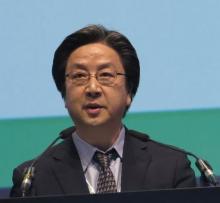MUNICH – For patients with HR-positive (HR+) and human epidermal growth factor receptor 2 (HER2)–advanced breast cancer who have progressed after endocrine therapy, a combination of the oral histone deacetylase (HDAC) inhibitor chidamide and exemestane appears safe and more effective than exemestane alone, according to results from the phase 3 ACE trial.
“This is the first phase 3 trial to demonstrate that an HDAC inhibitor plus endocrine blockade improves progression-free survival, compared to endocrine blockade alone in hormone receptor positive advanced breast cancer patients who have progressed after prior endocrine therapy,” said lead author, Zefei Jiang, MD, at the European Society for Medical Oncology Congress.
HDAC inhibitors have historically been used for psychiatric and neurologic applications, but interest in their antineoplastic potential has increased over the past decade. Chidamide is approved for T-cell lymphoma in China, but not in the United States, where three other HDAC inhibitors are labeled for T-cell lymphoma, and a fourth is approved for multiple myeloma.
Although no HDAC inhibitors are clinically available for breast cancer, the future may tell a different story. The HDAC inhibitor entinostat received a breakthrough therapy designation by the Food and Drug Administration after the phase 2 ENCORE 301 trial showed clinical benefit (also with exemestane for advanced breast cancer). Ongoing studies are also evaluating the potential for HDAC inhibitors in combination with immunotherapy.
“Histone modulation by HDACs is a very important mechanism for epigenetic regulation,” said Dr. Jiang, of the 307th Hospital of Chinese People’s Liberation Army in Beijing, highlighting associations with breast cancer drug resistance. HDAC inhibition may be able to overcome this obstacle by resensitizing tumors to estrogen modulator therapy.
ACE was a double-blind, placebo-controlled study involving 362 patients with HR+/HER2–advanced breast cancer who failed endocrine therapy. Patients had previously received no more than one round of chemotherapy for advanced disease, and no more than four therapies total. The treatment group received either chidamide 30 mg twice weekly with exemestane 25 mg daily (n = 241) or exemestane with placebo (n = 121). Tumor assessments were performed every 8 weeks, and the primary endpoint was progression-free survival (PFS).
The addition of chidamide nearly doubled PFS (7.4 months vs. 3.8 months) and provided a hazard ratio of .75 (P = .0336). Objective response and clinical benefit rates also were increased. At the time of presentation, data were too immature for an overall survival rate.
The most common grade 3 or higher adverse events were hematologic: neutropenia (50.8%), thrombocytopenia (27.5%), and leukopenia (18.8%), all considerably higher than 2.5% for each in the placebo group.
These tolerability issues were expected, however, based on previous chidamide findings.
“Not surprisingly ... 33% of patients had their dose reduced, 50% their dose interrupted, and this is despite the biweekly schedule,” said invited discussant Rebecca Dent, MD, of the National Cancer Centre in Singapore. Despite these issues, Dr. Dent concluded that chidamide otherwise “appears to be quite well tolerated,” and showed meaningful results.
“We now have a second trial demonstrating ... clinical benefit from the addition of HDAC inhibitors to endocrine therapy in [HR+] advanced breast cancer,” Dr. Dent said. “HDAC inhibitors clearly warrant further investigation in earlier settings of [HR+] advanced breast cancer and ... yet to be defined ... subgroups, and obviously we anxiously await the phase 3 results of entinostat.”
In consideration of the future, Dr. Dent suggested that more studies are needed to develop subgroup-targeted therapies and optimize sequencing. “We’ve really underestimated the selective pressure of these treatments and how they impact our subsequent therapies,” she said.
Dr. Dent noted how these factors limit predictive relevance of study findings in clinical practice, in which patients with different treatment histories may have completely different responses to the same agent.
To overcome these obstacles, Dr. Dent encouraged development of biomarker-driven strategies that can identify unique patterns of drug resistance and sensitivity. “This will allow us to ... identify which patients, which drug, and at which time.”
The ACE trial was funded by Chipscreen Biosciences.
SOURCE: Jiang Z et al. ESMO 2018, Abstract 283O.



